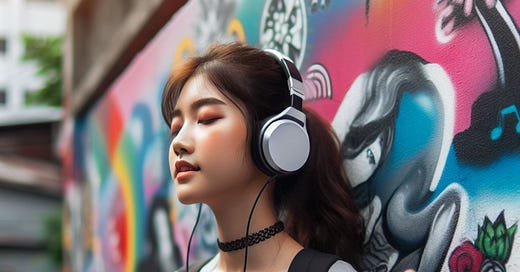AI Will Transform Music
AI is poised to revolutionise music in ways we can't even imagine, pushing the boundaries of creation, distribution, and even our very experience of sound.
The progress in how we consume music has been remarkable. From the crackle of 78s, through to the instant access of streaming, each format shaped not just how we listen, but how we discover and interact with music. The evolution of music delivery over the past 100 years is a fascinating topic that reflects the changes in technology, culture, and society.
In the 1920s sheet music was the dominant form of music distribution, as people could buy printed copies of songs and play them on pianos or other instruments. Radio broadcasting also emerged as a new way of listening to music, especially jazz and blues, which were popular genres at the time.
Through the 1930s and 1940s phonographs and vinyl records became more widespread and affordable, allowing people to listen to recorded music at home or in public places like jukeboxes. The sound quality and durability of vinyl records improved over time, and they could store longer songs and albums. Swing, big band, and country music were some of the styles that flourished in this era.
The invention of the transistor radio and cassette tapes in the 1950s and 1960s enabled portable and personal music listening, as people could carry their own devices and music collections with them. Rock and roll, pop, and soul music appealed to youth culture and a mass market.
The introduction of the compact disc (CD) and the Walkman in the following two decades revolutionised music delivery, as they offered higher sound quality, more storage capacity, and more convenience than vinyl records and cassette tapes. CDs also facilitated the digitisation and globalisation of music, as they could be easily copied and distributed at a time when disco, punk, and hip hop emerged.
At the turn of the century, the advent of the internet and the MP3 format transformed music delivery, enabling online music sharing, downloading, and streaming. Music became more accessible, diverse, and interactive, as people could access millions of songs from different genres, artists, and countries. The iPod and the iTunes store also popularised digital music players and online music stores.
More recently, the rise of streaming services like Spotify and Apple Music have dominated music delivery, offering unlimited access to music catalogues, personalised recommendations, and social features. Music consumption has become more mobile, flexible, and customised, as people listen to music anytime, anywhere, on any device. Streaming has also influenced the music industry, as it changed the way music is produced, marketed, and monetised.
Music delivery has evolved significantly, reflecting the changes in technology, culture, and society, but how will music delivery change in the future? Predicting that is tricky, but here are some exciting possibilities for what's next from immersive experiences, AI-powered curation, biomusic integration and more.
Imagine stepping into a song, feeling the bass vibrate through your floor and the artist's energy surround you. Spatial audio and VR concerts are already pushing boundaries, and advancements in haptic technology could create even more immersive experiences. Algorithms already recommend music based on your preferences, but imagine AI that understands your mood, activity, and even biometrics to curate a perfectly personalised soundtrack for your life.
Biomusic integration might sound futuristic, but research on music's impact on brainwaves and even physical health is ongoing, with earbuds of the future adjusting music to enhance focus, reduce stress, or even aid in sleep.
Owning music digitally through NFTs (non-fungible tokens) could revolutionise artist compensation and give fans a deeper connection with their favorite artists, directly supporting creators and even owning a piece of their work.
Real-time collaboration on music creation, where fans contribute to remixes, lyrics, or even instrumentation, could blur the lines between artist and audience.
Imagine collaborating with an AI that can understand your musical style, predict your next chord, and even generate fresh melodies and harmonies. No more writer's block, just a seamless flow of musical ideas bouncing between you and your silicon muse.
Forget one-size-fits-all tunes. AI will tailor music to your mood, preferences, and even biofeedback in real-time. Upbeat for your morning jog, calming for your workday, and epic for your late-night coding session – your soundtrack will be as unique as you are.
Bid farewell to passive listening. AI-powered concerts will let you influence the music in real-time as you sway to the melody with your phone, choosing the next verse through AR overlays, or even stepping onto a virtual stage to jam alongside your favorite artists.
Forget lyrics, your music will understand your feelings. AI will analyse your voice, facial expressions, and even brainwaves to create music that resonates with your deepest emotions. Need a good cry? Your AI therapist will serenade you with the perfect melancholic melody.
AI-powered platforms will bypass traditional music labels, giving every artist a fair shot at global audiences with AI algorithms promoting your music to the perfect listeners, based on their interests and demographics.
Instruments might adapt to your playing style and preferences. Guitars that bend notes with a thought, drums that adjust sensitivity to your touch, and keyboards that morph layouts based on your musical exploration, are all possibilities. AI will make instruments extensions of ourselves blurring the line between player and machine.
In the movie business, AI will analyse scripts and generate eerily fitting soundtracks full of matching textures and rhythms, an AI sonic architect, crafting bespoke sonic environments for any creative endeavor.
Forget DJs, AI will become the ultimate remix master. Imagine feeding an AI a library of music and letting it loose to create genre-bending mashups, unexpected remixes, and even AI-composed sequels to your favorite songs. Get ready for musical surprises that will blow your mind (and speakers).
This is just a taste of the sonic wonderland that awaits us. The future of music is going to be “lit”, and AI is the conductor!




